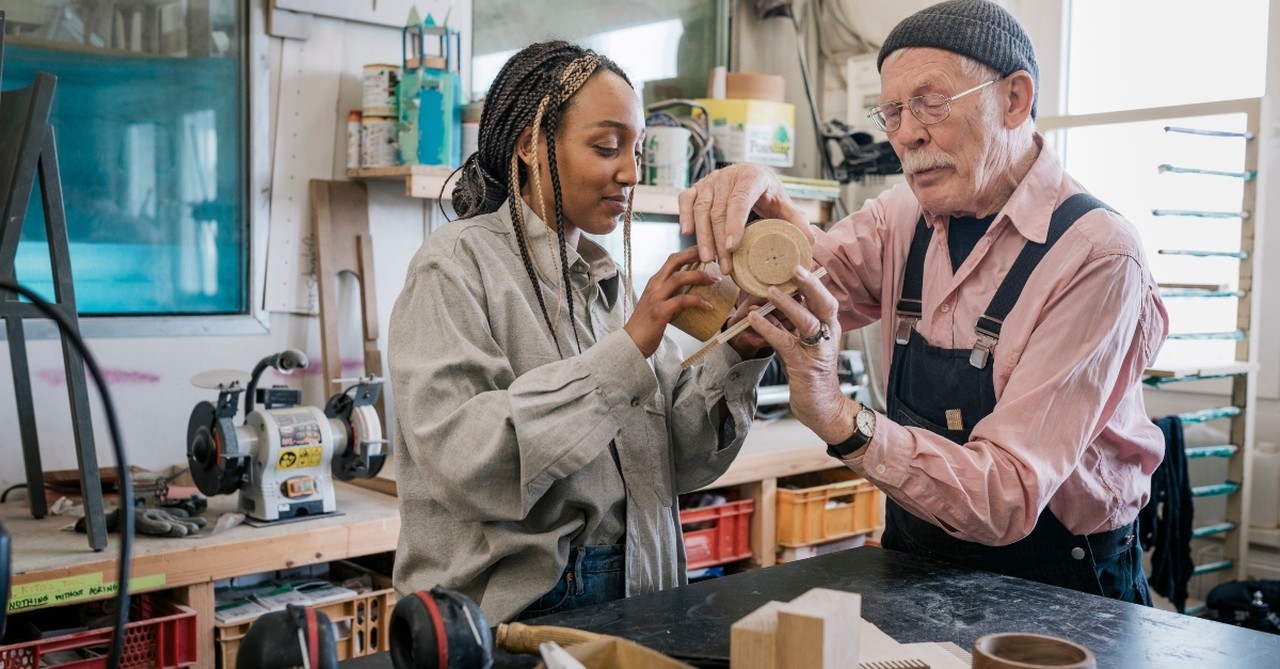7 Ways Seniors Can Engage with Younger Generations in Their Church and Community

As a senior, you have a lot to offer the younger people around you – and younger generations can offer you a lot, as well. But it can be challenging to get to know them and build intergenerational friendships. You bring life experience and spiritual wisdom that younger people can learn from, while they offer you energy and fresh perspectives that can renew you.
Building intergenerational friendships gives everyone involved a sense of belonging and mutual inspiration. Psalm 71:18 captures the importance of this: “Even when I am old and gray, do not forsake me, my God, till I declare your power to the next generation, your mighty acts to all who are to come.” So, reach out to the younger people you know in your church and community.
Here are seven ways seniors like you can engage with younger generations in church and community life.
Photo credit: ©Getty Images/Highwaystarz-Photography
1. Engage through Prayer and Spiritual Encouragement

1. Engage through Prayer and Spiritual Encouragement
SLIDE 1 OF 7
One of the most important ways you can connect with younger generations is through prayer and spiritual encouragement. Praying for and with younger members of your church welcomes God’s power into your lives and leads to close spiritual bonds between you.
There are many ways to do so, such as by joining prayer groups, participating in church-wide prayer events, or simply talking with younger people you know to ask them how you can pray for them and following up with them regularly. James 5:16 encourages you that: “The prayer of a righteous person is powerful and effective.” Your prayers for younger people can help them feel supported and valued in your church and community.
Praying also opens doors for spiritual mentoring. When you talk with younger people about their prayer requests, you can share what you’ve been praying for in your own life, how God has been answering your prayers so far, and how your prayer life has helped you grow closer to God. In addition to in-person conversations, consider writing notes of encouragement or cards with Bible verses to give to the younger people you’re praying for, to remind them of God’s love for them. These small practices can be significantly meaningful and have a lasting impact, especially when people are going through a crisis or struggling with doubt or worries.
You can also talk with younger generations about how you apply Bible verses on prayer to your life, such as Philippians 4:6-7, which encourages praying about everything and trusting God to send peace in response: “Do not be anxious about anything, but in every situation, by prayer and petition, with thanksgiving, present your requests to God. And the peace of God, which transcends all understanding, will guard your hearts and your minds in Christ Jesus.” Your dedication to prayer and encouragement will not only bless those you pray for, but can also deepen your own faith as you witness God’s work in their lives.
Photo credit: ©Getty Images/fizkes
2. Mentor through Your Life Experiences

2. Mentor through Your Life Experiences
SLIDE 2 OF 7
You have a wealth of knowledge from years of going through life’s ups and downs. By mentoring younger people, you can provide valuable guidance on important areas of their lives, such as their relationships, studies, careers, and spiritual growth. You can mentor them either through an established mentoring program in your church or community, or informally, like over coffee, during small group discussions, or in everyday conversations.
Sharing testimonies of how God has been faithful to you over the years is a powerful way to inspire and motivate younger generations to seek God more in their own lives. Consider telling stories of how you leaned on your faith during both good and bad times during your life. Titus 2:3-5 encourages older men and women to teach and model holy behavior, and you can do so through mentoring.
Mentoring can benefit you along with the younger people you mentor. Proverbs 27:17 points out the power of mentoring to help both people involved: “As iron sharpens iron, so one person sharpens another.” Mentoring can help younger believers discover more of God’s wisdom and apply it to their lives well. Simple mentoring conversations can make a significant positive impact on a younger person’s life. Mentoring can also help you leave a lasting spiritual legacy and gain fresh perspectives from younger people that can challenge and encourage you.
Photo credit: ©Getty Images/DjelicS
3. Participate in Service Projects Together

3. Participate in Service Projects Together
SLIDE 3 OF 7
Serving people in need together is a powerful way to unite generations. You can collaborate with younger church members on outreach projects such as organizing clothing and food drives or cleaning community parks. By working side by side, you can form meaningful bonds with younger people while showing them how your faith motivates you to let God’s love flow through your life in practical ways. Galatians 6:2 encourages you to: “Carry each other’s burdens, and in this way you will fulfill the law of Christ.”
By working on service projects together, you can also teach younger people through your actions about God’s grace and mercy for everyone. If you don’t find existing service project opportunities that work well for you and the younger people you know to do together, organize a service project yourself. Intergenerational service projects can help younger participants apply James 1:27 to their lives: “Religion that God our Father accepts as pure and faultless is this: to look after orphans and widows in their distress...”.
Sharing these experiences together gives you the chance to pass on your passion for service – especially when you choose ongoing service projects, instead of just one-time service events. Younger people will not only see your willingness to serve consistently but will also learn valuable lessons about putting their faith into action as a regular lifestyle.
Related Resource: Tips for Navigating Difficult Family Conversations
In this episode of "Next Steps 4 Seniors," host Wendy Jones discusses strategies for initiating difficult conversations about aging, decline, and end-of-life planning with family members. Her guest, Dr. Harms, shares her personal experiences with loss and grief, emphasizing the importance of forgiveness and clear communication. Key strategies include starting with a clear purpose, choosing the right time, practicing active listening, and using "I" statements. The episode underscores the value of proactive discussions and reconciliation.
Photo credit: ©Getty Images/Fly View Productions
4. Embrace Technology and Digital Connection

4. Embrace Technology and Digital Connection
SLIDE 4 OF 7
Using the latest technology can give you powerful opportunities to connect with younger generations. By learning to use text messaging, social media, video calling platforms, and other types of technology that younger people you know use, you can stay in touch and participate in activities that they value. Younger members of your community are often enthusiastic about teaching these skills. So, don’t hesitate to ask them to show you how to use a particular technology.
While embracing technology might seem stressful at first, remember that God says in Isaiah 43:19: “See, I am doing a new thing! Now it springs up; do you not perceive it?” God often calls you to step out of your comfort zone to accomplish a good purpose, and learning technology is one way to engage with God’s mission in new ways.
Through digital platforms, you can join virtual Bible studies, share testimonies online, or simply keep in touch with younger loved ones who live far away. Psalm 78:4 reinforces the importance of using every available tool to share God’s works: “We will not hide them from their descendants; we will tell the next generation the praiseworthy deeds of the Lord, his power, and the wonders he has done.”
By stepping into the digital space, you can show younger generations that you are committed to building lasting relationships and that you value what they care about. That will make it much easier to connect with them than if they think you’re out of touch with what they value. As you become more comfortable with digital tools, you’ll find new ways to build friendships with younger people, share your faith, and participate in community life.
Photo credit: ©Getty Images/bernardbodo
5. Share Hobbies and Skills

5. Share Hobbies and Skills
SLIDE 5 OF 7
Hobbies and skills give you natural and enjoyable ways to connect with younger generations. What do you do well, and enjoy doing? Find some younger people who share your interests and would like to learn what you can teach them about those shared interests. By inviting younger people to learn activities like cooking, gardening, woodworking, sewing, – or any other hobby you do well – you create a space where friendships between you can grow.
These shared experiences often lead to deeper conversations, since hands-on activities can break down barriers and make trust easier between you. Ecclesiastes 4:9 highlights the value of collaboration: “Two are better than one, because they have a good return for their labor.” Teaching a skill allows you to pass on valuable knowledge while giving younger people a sense of accomplishment and belonging.
Working together on something fun and meaningful can become acts of worship, as Colossians 3:23-24 says: “Whatever you do, work at it with all your heart, as working for the Lord, not for human masters.” Hobbies can also become bridges to spiritual conversations. For example, gardening together could spark discussions about God’s creation and his care for us.
As you teach these hobbies, remember to emphasize the joy of creating and working with others. Celebrate the successes of those you teach and ask them to pass on these skills to others in the future. Encourage the younger people you know to become lifelong learners, as well.
Photo credit: ©Getty Images/Willie B. Thomas
6. Support Young Families with Children

6. Support Young Families with Children
SLIDE 6 OF 7
Churches are often filled with busy young families juggling work and parenting. You can be a tremendous blessing by offering to babysit, tutor children, or help with family-oriented church activities like teaching children’s Sunday School or volunteering at special family events. Your involvement lightens the load for parents and gives younger generations the benefit of seeing you model God’s love in action.
Proverbs 22:6 highlights the long-term impact of guiding children: “Start children off on the way they should go, and even when they are old they will not turn from it.” Whether you’re volunteering in children’s ministries, sharing Bible stories, or consistently praying for children and their families, your influence can help shape young lives. Jesus’ words in Matthew 19:14 show how he values helping children grow spiritually: “Let the little children come to me, and do not hinder them, for the kingdom of heaven belongs to such as these.”
By investing in young families, you create a ripple effect of faith and love. These relationships can bless you with the joy and energy that children bring you, and at the same time you can give their parents much-needed support. Supporting young families with children is a beautiful way to live out God’s call to care for and nurture the next generation. Even simple acts of kindness – like preparing meals for new parents or offering to help children with school projects – can make a lasting positive impact. Through your support, you can become a tangible example of God’s loving care.
Photo credit: ©Getty Images/Paul Bradbury
7. Join or Lead Intergenerational Worship

7. Join or Lead Intergenerational Worship
SLIDE 7 OF 7
Worship is a wonderful way to unite generations in praise. You can participate in planning intergenerational worship services that blend traditional hymns with contemporary songs, so all age groups feel included. At those services, you can share stories of God’s work. Psalm 145:4 beautifully describes the power of shared worship: “One generation commends your works to another; they tell of your mighty acts.”
Your presence and leadership in worship can cross generational divides. Colossians 3:16 reminds you of the richness of worship: “Let the message of Christ dwell among you richly as you teach and admonish one another with all wisdom through psalms, hymns, and songs from the Spirit.”
Intergenerational worship experiences strengthen connections and remind everyone of the beauty of a diverse yet unified church congregation focused on glorifying God together. Worshipping with younger people can help create a shared sense of purpose and belonging between you.
In conclusion, engaging with younger generations is important to strengthen your church and community while living out your faith in meaningful ways. As a senior, your wisdom, experience, and faith journey uniquely positions you to inspire younger generations. The younger people you know can benefit from learning from you, and you can benefit from building connections with them, as well. So, build intergenerational friendships in your church and community. God will be working in and through you to spread his love across generations!
Photo credit: ©Getty Images/eggeeggjiew

Originally published January 17, 2025.









